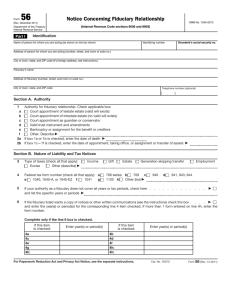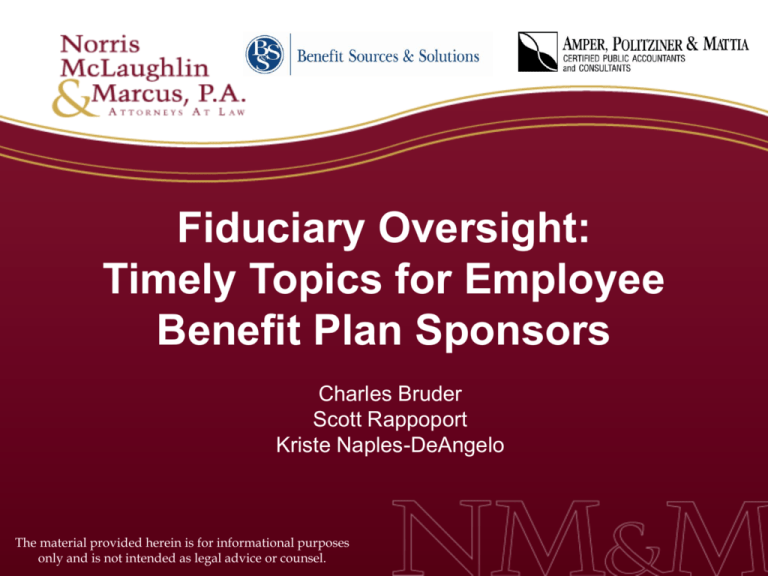
Fiduciary Oversight:
Timely Topics for Employee
Benefit Plan Sponsors
Charles Bruder
Scott Rappoport
Kriste Naples-DeAngelo
The material provided herein is for informational purposes
only and is not intended as legal advice or counsel.
Please help yourself to food
and drinks
Please let us know if the room
temperature is too hot or cold
Bathrooms are located past
the reception desk on the right
Please turn OFF your cell
phones
Please complete and return
surveys at the end of the
seminar
2
Fiduciary Oversight Under
ERISA
Presented By: Scott Rappoport
Fiduciary Oversight In The Spotlight
ERISA litigation up 25%/year (past 4 years)
LaRue v. DeWolff (Supreme Court 10/2007)
Financial Market Turmoil
Pension Protection Act (2006)/DOL disclosure
initiatives (2008)
4
Who is a Fiduciary?
Any person who:
Exercises any discretionary authority or discretionary
control in managing the plan or who has any authority
or control in managing or disposing of its assets;
Has any discretionary authority or responsibility in
administrating the plan.
5
Responsibilities of a Fiduciary
Under ERISA
Fiduciaries are required to perform their duties
solely in the interest of the plan participants and
their beneficiaries.
Fiduciaries must exercise the care, skill, prudence,
and the diligence of a prudent person who is
acting in a like capacity and is familiar with such
matters.
6
What are Fiduciaries’ exposures
under ERISA?
Fiduciary liability is personal,
absolute and unlimited. ERISA
holds fiduciaries personally
liable for their actions
7
Safe Harbors
Voluntary
May insulate from liability
Excellent to take advantage of
8
404(a) Safe Harbor ProvisionsDelegating to Investment Counsel
Investment decision delegated to “prudent expert”
Experts selected by due diligence process
Experts exercise discretion over assets
Expert acknowledges co-fiduciary status in writing
Fiduciary must ensure that experts perform the
agreed upon tasks using agreed upon criteria
9
Fiduciary Adviser Safe Harbor
Provisions
Select a qualified fiduciary
adviser who:
Acknowledges fiduciary status in
writing
Discloses all conflicts of interest
Discloses all forms of
compensation
10
404(c) Safe Harbor Provisions-Participant
Education & Communications
Requires notification in writing of intent to comply with
404(c) safe harbor
Three different investment options with differing risk/return
profiles
Information and education on the different investment
options
Opportunity to change investments with appropriate
frequency
11
Qualified Default Investment
Alternative (QDIA)
Plan sponsor can avoid liability for participant
investment decisions by offering QDIA
Age-based funds or models
Risk-based funds or models
Age-based managed accounts
Money market accounts for 90-120 days
12
Fiduciary Oversight
Benefit Sources & Solutions Best Practices
Creation of the Investment Policy
Statement/Governing Body Document
Creation of the Investment Committee
Designation of qualified professional investment
counsel
Ongoing monitoring & reporting
13
Monitoring & Reporting
Benefit Sources & Solutions Best Practices
Review actual Portfolio for MPT Statistics
Appropriate Index
Peer group
Compare investment expenses for risk & reward
Create a quarterly correlation matrix
Review operational quality of investment managers
Disclose plan expenses and revenue sharing
Create “plain English” quarterly “minutes” for plan
sponsor tied to an annual IPS review
Standards defined in the IPS
14
Monitoring & Reporting
Investment Committee Meeting Minutes
Information that is provided must be evaluated and
actions that are considered must be documented
Watch list procedures must be followed
15
16
The Profit Sharing/401k Council of America’s
First 403(b) Benchmarking Survey
385 Not-for-profit respondents
41% of respondents are making changes due to new
Treasury Regulations
Benchmarking data is crucial to running your program
“ How can you manage what you can’t measure?”
17
Plan Agreement Types
25.2% have an Annuity Group Custodial Agreement (GCA)
19.5% have Non-Annuity GCA
Balance have Individual Custodial Agreements
The larger the plan, the more like they are to utilize a NonAnnuity Custodial Agreement
18
Employer Contribution
89.4% of employers contribute to the plan
41.1% provide a stated match percentage
13.8% provide a guaranteed percentage of participants’
pay
Most common (45.4%) match formula is dollar for dollar
On the first 3% of pay 15.3%
19
Other Statistics
Average participation rate is 75.8%
50-199 participants
81%
1000+
63.4%
10.9% offer Roth, 8.9% make Roth contributions when
offered
Average funds offered is 21
46.3% have an investment policy statement, 34.2% unsure
if they have
20
How Can Benefit Sources &
Solutions Help
Fiduciary Review
Checklist
Mutual Fund Review
Benchmarking
Source of technical information 888-560-5171
21
2009 UBA
Health Plan Survey
22
Copyright © 2009 United Benefit Advisors, LLC. All Rights Reserved.
Employees Waiving Medical Coverage
and Waiver Bonus
20%
$160
18.4%
18%
$143
$140
$119
16%
$120
14%
$100
12%
$80
10%
$60
8%
6%
$40
2.8%
4%
$20
2%
$0
0%
% Waiving Coverage
% Offering Waiver Bonus
Copyright © 2009 United Benefit Advisors, LLC. All Rights Reserved.
Avg. Monthly Single
Bonus
Avg. Monthly Family
Bonus
23
Annual Cost Per Employee - Total Cost
$9,907
$10,000
$9,000
$8,462
$7,925
$7,646
$7,642
$8,000
$7,085
$6,906
$7,000
$6,000
$5,000
$4,000
$3,000
$2,000
$1,000
$0
PPO
HMO
POS
Copyright © 2009 United Benefit Advisors, LLC. All Rights Reserved.
CDHP
EPO
FFS
ALL
24
Changes to Total Premiums
18.7%
20%
18%
16%
13.8%
13.0%
14%
12.0%
12%
10%
8%
7.3%
6.7%
7.3%
6%
4%
1.3%
2%
0%
Initial Offer - Last Plan Anniversary
25th Percentile
Median
Copyright © 2009 United Benefit Advisors, LLC. All Rights Reserved.
Final Change - Last Plan Anniversary
75th Percentile
Average
25
Monthly Employee Share - Dollar Amount
$600
$546
$500
$419
$367
$400
$300
$231
$200
$140
$90
$100
$105
$54
$0
Single
25th Percentile
Family
Median
Copyright © 2009 United Benefit Advisors, LLC. All Rights Reserved.
75th Percentile
Average
26
$0 Employee Contribution and
Percent with Dependent Coverage
60%
52.7%
50%
40%
29.4%
30%
20%
8.5%
10%
0%
No Single Contribution
Required
No Family Contribution
Required
Copyright © 2009 United Benefit Advisors, LLC. All Rights Reserved.
% of Employees with
Dependent Coverage
27
Basic Plan Design
Components
CoPays, Deductibles, Coinsurance and Out-ofPocket Maximums
28
Copyright © 2009 United Benefit Advisors, LLC. All Rights Reserved.
Median CoPays
$350
$300
$300
$250
$200
$150
$100
$100
$50
$20
$40
$30
$0
PCP
SCP
Urgent Care Center
Copyright © 2009 United Benefit Advisors, LLC. All Rights Reserved.
Emergency Room
Per Admission CoPay
or Ded.
29
In-Network Employee Deductibles
$3,500
$3,000
$2,500
$2,000
$1,716
$2,000
$1,240
$1,500
$1,000
$1,000
$709
$1,000
$500
$500
$500
$0
Single
25th Percentile
Family
Median
Copyright © 2009 United Benefit Advisors, LLC. All Rights Reserved.
75th Percentile
Average
30
Out-of-Network Employee Deductibles
$7,500
$7,000
$5,836
$6,000
$5,000
$4,000
$4,000
$3,000
$2,545
$3,000
$2,000
$2,000
$2,000
$1,000
$1,000
$0
Single
25th Percentile
Family
Median
Copyright © 2009 United Benefit Advisors, LLC. All Rights Reserved.
75th Percentile
Average
31
Wellness Programs and Incentives
56.9%
60.0%
50.0%
40.0%
30.9%
30.0%
20.0%
11.1%
10.0%
4.9%
0.0%
% Offering Wellness
Program
Cash to Premium, 401(k),
FSA, etc.
Extra Paid Time Off
Gift Certificates or Health
Club Dues
Incentives Included
Copyright © 2009 United Benefit Advisors, LLC. All Rights Reserved.
32
Wellness Programs & Components
78.4%
80%
70%
56.9%
60%
47.1%
50%
41.8%
39.7%
40%
30%
20%
11.3%
10%
0%
Health Risk
Assessment
Seminars /
Workshops
Physical Exam or
Blood Draw
Copyright © 2009 United Benefit Advisors, LLC. All Rights Reserved.
Coaching
Incentives /
Rewards
Other
33
HRA And HSA Plans
68.7%
70%
87.6%
90%
80%
60%
70%
50%
60%
40%
50%
30%
40%
30%
20%
20%
10%
6.0%
8.0%
11.2%
7.5%
10%
0%
0%
% Offered
% Enrolled
% With First
Dollar Preventive
HRAs
Copyright © 2009 United Benefit Advisors, LLC. All Rights Reserved.
% Offered
% Enrolled
% With First
Dollar Preventive
HSAs
34
Rx Tier Prevalence
80%
71.7%
70%
60%
50%
40%
30%
20%
10%
13.6%
12.5%
2.2%
0%
One-Tier Plans
Two-Tier Plans
Copyright © 2009 United Benefit Advisors, LLC. All Rights Reserved.
Three-Tier Plans
Four-Tier Plans
35
Median Rx Retail CoPays by Plan Design
$75
$80
$70
$60
$50
$50
$50
$40
$30
$30
$30
$30
$20
$10
$10
$10
$10
$0
2 Tier Plan
1st Tier
3 Tier Plan
2nd Tier
Copyright © 2009 United Benefit Advisors, LLC. All Rights Reserved.
4 Tier Plan
3rd Tier
4th Tier
36
Separate Prescription Drug Deductible
Median Rx Deductible
Plans with Separate Rx Deductible
$250
$250
$200
9.3%
$150
$150
90.7%
$100
$50
With Separate Rx Deductible
Without Separate Rx Deductible
Copyright © 2009 United Benefit Advisors, LLC. All Rights Reserved.
$0
Single
Family
37
Plan Sponsor/Management Responsibilities
Plan Governance and Fiduciary Monitoring
Best Practices and How to Avoid the Most Common
Errors in Your Employee Benefit Plan
PRESENTED BY:
KRISTE NAPLES-DEANGELO, CPA, MBA
PARTNER-PENSION SERVICE GROUP
38
Plan Sponsor/Management Responsibilities
Who is a Plan Fiduciary?
Employer/Plan Sponsor is the ultimate plan
fiduciary
Many fiduciaries are named in the plan or
policies of the plan
• Trustee(s)
• Investment Managers
• Plan Administrator – (not TPA) may be an
individual, the employer or subsidiary
39
Plan Sponsor/Management Responsibilities
Who is a Plan Fiduciary (continued)?
Corporate Officers – may be fiduciaries by virtue of their
office and with respect to decisions surrounding the plan
Selection of service providers
Design of the plan benefits
Hiring of investment managers
Selection of funds
40
Plan Sponsor/Management Responsibilities
Who is a Plan Fiduciary (continued)?
Board of Directors – They generally appoint the
Retirement/Investment Committee members or corporate
officers who are responsible for decisions
2509.75-8 D-4 “the board of directors may be responsible for
selection or retention of plan fiduciaries. If so, they exercise
“discretionary authority or discretionary control and are
therefore fiduciaries of the plan. However, their responsibility
and consequently liability is limited to such.
Retirement/Investment Committee – To the extent that they
exercise discretion over the plan
41
Plan Sponsor/Management Responsibilities
Who is NOT a fiduciary?
Professional services if they offer:
• Legal Services
• Accounting or Auditing Services
• Recordkeeping, third-party administrators
or actuarial services
42
Fiduciary Duties
Exclusive Benefit Rule – to operate the plan for the
exclusive benefit of plan participants and their
beneficiaries
Prudent Man Rule (ERISA 404(a)(1)(B))- with care, skill,
prudence and diligence
Operate the plan according to the terms of the plan
Operating outside the governing terms can result in
disqualification of the plan and breech of duty.
Diversified and appropriate investments – to manage the
risk of loss of the investments
Reasonable plan expenses
43
Plan Governance – What to do?
Fiduciary Standards – Have not changed, they are just
more magnified!
What to do?
Have a Plan Governance Committee
Have Committee meetings regularly
• In light of the economy, have them more regularly
Keep written minutes
• Document EVERYTHING!
• Establish clear policies and procedures
Create and follow the Investment Policy Statement
• Make sure that it is addressed on a regular basis and
documented
44
Plan Governance – What to do?
Communicate with and educate plan participants
Transparency with regard to fees
Provide adequate investment information to enable proper
decisions by participants
Consult experts
Due to the prudence requirements, fiduciaries must seek
experts with the required knowledge necessary
Consider an ERISA attorney relationship
The fiduciary has a duty to prudently select and monitor
these experts in their process
Bottom Line – Critical to have an effective process to
identify and manage risk
45
Plan Sponsor Responsibilities
Fiduciaries that don’t follow basic standards
May be personally liable to restore losses to the Plan
May be liable to restore any profits made as a result of
improper use of Plan assets
Responsibilities include Plan administrative functions:
Maintaining books and records
Filing complete and accurate Form 5500
Establish safeguards to ensure that fiduciary
responsibilities are met
One way this can be accomplished is by implementing
internal controls over financial reporting
46
Internal Controls Over Financial Reporting
Value of Internal Controls protect your plan in 2 Ways:
1)
By minimizing opportunities for unintentional errors or
intentional fraud that may harm the plan
• Preventative Controls help accomplish this objective which
are designed to discourage errors or fraud
2)
By discovering small errors before they become big
problems
• Detective Controls help accomplish this objective by
identifying the error or fraud after it occurs
47
Internal Controls Over Financial Reporting
Your Plan’s policies, procedures and organization design
are all part of the internal control process
The following are some general characteristics:
Procedures that provide for segregation of duties
Qualified personnel to perform their assigned duties
Sound policies and procedures to be followed by
personnel when performing their duties and
responsibilities
A system that ensures proper authorization and proper
recording of financial transactions.
48
Internal Controls Over Financial Reporting
Internal Controls will vary depending on the Plan’s size, type
and complexity
Use a risk oriented approach
Ensure that high risk areas have adequate controls
Ensure that low risk areas do not have excessive controls
Before making a decision to adopt a control consider the
cost
Consider the potential benefit the control will provide
Consider the possible consequence of not implementing
it.
49
Internal Controls Over Financial Reporting
Determine Your Plan’s Control Objectives
1st step is establishing controls over financial reporting to
determine the objective or what you want to achieve:
reliable financial statements that are prepared in
accordance with generally accepted accounting
principles.
Controls should be designed to address financial statement
assertions in the various components of the Plan’s financial
statements
Assertions can be classified into 5 broad categories:
• Existence or occurrence, Completeness, Rights and
Obligations, Valuation or allocation, Presentation and
disclosure
50
Internal Controls Over Financial Reporting
Existence or occurrence – Do assets and liabilities actually
exist at a given date? Did recorded transactions occur during the
current year or did they take place in the prior year or subsequent
year?
Completeness - Are all transactions that should be presented in
the financial statements actually there?
Rights and Obligations - Do the assets and liabilities reported in
the financial statements appropriately reflect the rights and
obligations of the Plan as of the date of the Statement of Net Assets
Available for Benefits?
Valuation or allocation - Are assets and liabilities valued
properly?
Presentation and disclosure - Are transactions recorded in
proper accounts and is each component properly classified/disclosed?
51
Internal Controls
Control Objectives related to the Plan’s financial
statements assertions should cover each of the
following areas:
•
•
•
•
•
•
•
Investments
Contributions
Benefits (distributions)
Participant data
Plan obligations
Participant loans
Administrative Expenses
52
Monitoring Controls
Monitoring your controls is critical!
Monitoring should be designed to identify and correct
weaknesses in internal control before they can result in a
significant misstatement in your plan’s financial
statements
You should periodically review the design and operation of
your plan’s controls, and make changes where they are
not providing the desired result.
It is important to keep in mind that your auditor, under
professional standards, cannot be part of your plan’s
internal control.
53
Example of Selected Controls Employee Benefit Plans
Contributions
Amount of contributions by employers and participants
meet authorized or required amounts
• Contribution requirements or limitations are described in Plan
document or collective bargaining agreement
• Contributions are determined using correct eligibility lists
• Actuary is used to perform periodic valuation reports
Contributions are recorded at the appropriate amount and
in the appropriate period on a timely basis
• Employer payroll records are compared with contribution
calculations
54
Example of Selected Controls Employee Benefit Plans
(Continued)-Contributions are recorded at the appropriate
amount and in the appropriate period on a timely basis
•
•
Initial controls are established over contribution records for both
participant and employer contributions (salary reduction
amounts, after tax and rollovers)
Clerical accuracy of contribution form is checked
Participant Data
•
•
•
Participant forms (enrollment, transfers, investment allocations
etc.) are controlled and are maintained for future reference
The number of plan participants is reconciled using enrollment
forms
Participant data entries are updated and reconciled to employers
personnel and payroll records
55
Example of Selected Controls Employee Benefit Plans
(Continued) Participant Data
Participant eligibility is determined in accordance with
the plan document
Access to participant data is controlled to prevent
unauthorized changes or additions
Investments- Plan Management is held responsible
for investment valuations and financial statement
disclosures! Even where there are outside investment
custodians, asset or fund managers, or other service
providers to assist in determining the value of investments
on a plan’s financial statements and Form 5500, the DOL
holds plan management responsible. This
responsibility cannot be outsourced to a 3rd party.
56
Example of Selected Controls Employee Benefit Plans
Investments
Transactions are recorded in the appropriate periods on a
timely basis
• Control totals per participant records are compared to
control totals from the trust statements on a regular
basis
• Purchases and sales (as a result of contributions and
distributions) of mutual funds are reviewed to
determine that the net asset value agrees to
published quotes
• Purchases and sales are reviewed to determine that
the appropriate fair value are utilized
• Understand valuation methodology and the services
that the custodian will provide
57
Common Errors Noted During A Plan Audit
Improper application of definition of
compensation resulting in incorrect deferrals and
employer match
Improper application of plan’s eligibility
provisions
Improper use of forfeitures in accordance with
the terms of the plan
Timeliness of deferrals and lack of reconciliation
of deferrals withheld and deposits into the plan
Actuarial census errors/outdated information
58
Best Practices to Avoid Audit Pitfalls
Know who is a fiduciary and what their roles are DOCUMENT
Know your fiduciary responsibilities
Know the essential elements of the plan - DOCUMENT
Read the plan document at least annually and anytime
you are unsure about a provision in the plan document
Ensure that the recordkeeper, trust company, and staff
working on the plan are all following written plan
document
Conduct regular compliance reviews or audits of plan
policies, procedures and operations
Review fidelity bond policy - DOCUMENT
59
Best Practices to Avoid Audit Pitfalls
Employee contributions-must be deposited into the plan as
soon as can be segregated from the company’s assets but
no later than the 15th business day of the following
month- This is not a safe harbor! DOCUMENT your
policy!
When hiring a Service Provider, make sure that they are
qualified (financial condition, experience with retirement
plans of similar size, how many employee benefit plans)
DOCUMENT the hiring process and due diligence
Identify parties in interest - DOCUMENT
Review Plan for prohibited transactions - DOCUMENT
Review Plan Expenses and DOCUMENT
60
Best Practices to Avoid Audit Pitfalls
Monitor Service Provider
Review service provider performance
Read service agreement, if applicable
Read any reports that they provide
Review fees charged
Ask about policies and practices
Follow up on participant complaints
Review of SAS 70 of recordkeeper and or custodian
DOCUMENT
Review Plan investments and review investment policy
statement and DOCUMENT
61
Best Practices to Avoid Audit Pitfalls
Hold regular meetings with the Retirement Plan committee
or investment committee or those charged with plan
governance and DOCUMENT
DOCUMENT, DOCUMENT, DOCUMENT!!!!!!!!
62
Tools Available to Assist
Employee Benefit Plan Audit Quality Center
Website:
www.aicpa.org/ebpaqc
• Includes Plan Advisories for communication and research on plan
responsibilities
• Includes tools for Plan Sponsors
Your Third Party Provider
www.dol.gov
Employee Benefits Security Administration
Office of the Chief Accountant: 202.693.8360
EFAST Help Line: 1.866.463.3278
Plan Sponsor Magazine
Profit Sharing Council of America (IPS)
63
Fiduciary Oversight:
A Process & Approach to Best Practices
Presented By: Charles A. Bruder
I may have violated the provisions of a
company sponsored retirement plan…what
can I do?
65
Fiduciary Duties and Corrective Action
– A Practical Approach
• Several available options
– Do nothing, and hope that the problem is not discovered
– “Self correct” the potential fiduciary breach
– Disclose the breach to the appropriate government
agency/program
• The key to addressing a breach of a fiduciary duty
is identifying the available correction methods and
determining the appropriate course of action
66
The “Do Nothing” Approach
• Pros
– No action or cost involved
– Does not require disclosure to any government
agency/plan participant
– May result in cost savings to the plan sponsor
– Permits the plan sponsor to continue with its
current form of plan administration
67
The “Do Nothing” Approach
• Cons
– The “ticking time bomb”
– Raises the potential costs associated with
corrective action
– Failure to address a fiduciary breach may be a
further breach of fiduciary duty
– Audit Lottery – Are you feeling lucky?
68
Fiduciary Duties and Corrective Action
– A Practical Approach
Available Corrective Programs
1.
2.
3.
Employee Plans Compliance Resolution System
(“EPCRS”)
Voluntary Fiduciary Correction Program (“VFCP”)
Internal Revenue Service (“IRS”) Notice 2008-113
69
Employee Plans Compliance Resolution
System
• EPCRS contains three correction programs:
– Self-Correction Program (SCP)
– Voluntary Correction Program (VCP)
– Audit Closing Agreement Program (Audit CAP)
70
Employee Plans Compliance
Resolution System
Qualification Failures
• Plan Document Failure
– Plan provision (or absence of provision) that
violates the Code
• Operational Failure
– Plan document complies with the Code but plan
doesn’t operate in accordance with its provisions
71
Employee Plans Compliance
Resolution System
Principles and Correction Methods
• Full correction required for all plan years
• Acceptable correction methods & retroactive plan
amendments
– Expanded definition of “reasonable and appropriate”
• Model correction methods provided in
Appendices A & B of Rev. Proc. 2008-50
72
Employee Plans Compliance
Resolution System
SCP – Self Correction Program
• No disclosure to IRS, no fee, no sanctions
• Can only correct operational failures
• Must have a favorable IRS Determination
Letter
• Must have established practices &
procedures to assure ongoing compliance
• Corrective action requires documentation
73
Employee Plans Compliance
Resolution System
SCP – Self Correction Program
• Insignificant vs. significant failures
– Applicable corrective period – choosing the right
one
– Factors in determining the type of failure which
may be self-corrected
• What if the failure cannot be self-corrected?
74
Employee Plans Compliance
Resolution System
VCP – Voluntary Compliance Program
• Single program and single-admission process
• Submission procedures
• Ends with a compliance statement – Don’t
need to sign statement
• Determination Letter/Retroactive Plan
Amendment may result in Determination
Letter if plan on-cycle
75
Employee Plans Compliance
Resolution System
SCP versus VCP
• Distinction between insignificant and significant errors
• List of Factors to Consider
–
–
–
–
–
–
–
whether failure occurred during period of exam
% of assets/contributions involved
# of years involved
% of participants affected
% of participants who could have been affected
correction within reasonable period
reason for the failure
• Uncertainty for plan sponsor
76
Employee Plans Compliance
Resolution System
Rev. Proc. 2008-50: New Fee Schedule
• VCP fee unchanged
• Compliance fee for §401(a)(9) failures reduced to
$500
• Fee for failure to amend for EGTRRA good-faith
amendments, §401(a)(9) interim amendments,
and amendments required to implement optional
law changes: flat $375
77
Employee Plans Compliance
Resolution System
Audit CAP
• Higher sanction
• Factors used in determining sanction:
– Practices in place to identify and prevent plan
failures
– Steps taken to correct failures
– Reason for the failures
78
Employee Plans Compliance
Resolution System
Audit CAP
•
•
•
•
•
Length of time that failures occurred
Number of NHCEs affected if plan is disqualified
Existence of a favorable Determination Letter
Whether the error involves a demographic failure
Whether the only failure is an employer eligibility
failure
79
Employee Plans Compliance
Resolution System
EPCRS – What is Not Covered
• Form 5500 filing delinquencies
– DFVC Program
• Prohibited transactions
• Funding deficiencies
– Certain limited relief available under the Worker,
Retiree and Employer Recovery Act of 2008
80
Fiduciary Duties and Corrective Action
– A Practical Approach
Voluntary Fiduciary Corrective Program
• Corrective program sponsored by the U.S.
Department of Labor
– Certain enumerated transactions which may be
corrected
•
•
•
•
•
Prohibited purchases
Sales and exchanges
Improper loans
Delinquent contributions
Improper plan expenditures
81
Fiduciary Duties and Corrective Action
– A Practical Approach
Why VFCP?
•
•
•
•
Type of corrective action required
Avoidance of civil penalties imposed by the IRS
Obtain a DOL “no action” letter
Avoidance of the imposition of excise taxes if the
class exemption provisions are met
• Processing/corrective costs
• Forum shopping
82
Voluntary Fiduciary Correction
Program
VFCP – Class Exemptions
• Six classes of prohibited transactions covered
– Failure to transmit contributions/loan payments in a
timely manner
– Loans made to parties in interest
– Sales of property with parties in interest
– Sales of real property to a plan with a leaseback to the
employer
– Purchase of an illiquid asset by a plan
– Certain plan expense issues
83
EPCRS or VFCP?
• Which program is appropriate for correction
of a fiduciary breach?
– Type of action (or inaction) which resulted in the
breach of fiduciary duty
– Appropriate correction method
• Crossover issues
– Cost/benefit analysis
– Processing time
84
Fiduciary Duties and Corrective Action
– A Practical Approach
Code Section 409A
• Although not technically a “fiduciary duty,” a
potential source of financial woe for an employer
• Code section has broad application to a variety of
arrangements
• IRS Notice 2008-113 provides a model correction
program
– Expands the program established under IRS Notice
2007-100
85
IRS Notice 2008-113
• Program scope
– No relief for documentary compliance failures
• Includes required amendments
–
–
–
–
Limited relief available for “insiders”
Applicable to “inadvertent and unintentional” errors
“Full” correction is required
Avoidance of excise taxes
86
IRS Notice 2008-113
Eligibility Provisions
• “Inadvertent and unintentional” operational errors
– Impermissible payments made to an employee
• Demonstrable steps must be taken to avoid future
errors
• Recipient’s income tax return for the year in which
the error occurred cannot be under IRS audit
• The error has been fully corrected
– IRS guidelines for full correction
• The company cannot be in financial distress
– Significant risk of non-payment?
87
IRS Notice 2008-113
Same Year Corrective Method
• Early payments must be returned to the company
• Late payments must be to the employee
- Non-insiders may take up to 24 months from income tax
return due date to repay
- Requires immediate and heavy financial need
• Interest payments may be required
• Avoidance of Code Section 409A penalties
88
IRS Notice 2008-113
Post Year Corrective Method
• Non-insiders
• Corrective methods are similar to the “same
year” correction guidelines
• Employee may be required to make interest
payments
• Avoidance of Code Section 409A penalties
89
IRS Notice 2008-113
Other Key Features
• Correction of impermissible stock right grants
– “Reset” feature
• Limited corrective opportunity for other
operational errors
– $16,500 ceiling in 2008
• Other corrections permitted but will not avoid
the 20% excise tax
• Employer notice requirements
90
Code Section 125
New Proposed Treasury Regulations
• Effective for plan years commencing on or after
January 1, 2009
• Apply to all arrangements which qualify for beneficial
income tax treatment under Code Section 125
– Group Medical Insurance Plans (“Flex Plans”)
– Premium Only Plans
– Medical Flexible Spending Accounts
– Dependant Care Flexible Spending Accounts
91
Code Section 125
New Proposed Treasury Regulations
• Treasury Regulations clarify that Code
Section 125 is the exclusive means under
which nontaxable group health benefits may
be provided to employees
– If your company plans do not satisfy the provisions
of the new proposed Treasury Regulations,
benefits paid under these plans will be taxable to
the participants.
92
Code Section 125 Proposed Treasury
Regulations - What Has Changed?
Written Plan Requirement
– Plans must include the following items:
• Specific details concerning all benefits available under the plan
• Eligibility provisions for participation (employees only)
• Rules governing benefits elections, maximum elective
contribution limits
• Rules governing the irrevocability of elections
• Details concerning employer contributions
• Definition of plan year
– Plans must be operated in accordance with stated terms
93
Code Section 125 Proposed Treasury
Regulations - What Has Changed?
Nondiscrimination Testing Required
– Cafeteria plans cannot discriminate in favor of
highly compensated employees
– Similarly situated employees must have a uniform
opportunity to elect to receive benefits
– Objective nondiscrimination testing formula is
provided in the Treasury Regulations
– “Safe Harbor” for premium-only cafeteria plans
94
Code Section 125 Proposed Treasury
Regulations – What Should Employers Do?
• Treasury Regulations apply to plan years
commencing on or after January 1, 2009
• Need to carefully review plan documents
– Summary plan descriptions
– Intranet/employee communications
– Cafeteria plan forms brochures
• Amend plan documents currently (if necessary)
• Create a compliance manual
95
COBRA Subsidy Notice Requirements
•
By April 18, 2009, group health plans subject to COBRA must issue to
“assistance eligible individuals” notice of the extended election period
of COBRA coverage and the COBRA subsidy provisions.
– A model notice is to be issued by the Secretary of Labor by March 19, 2009.
– 60 day election period
•
The notice must include specific information including:
– The forms necessary to establish eligibility for the premium reduction;
– Contact information for the plan administrator regarding the premium
reduction;
– A description of the extended election period;
– A description of the individual’s obligation to notify the plan administrator of
eligibility for subsequent group health plan coverage; and
– A description of the eligible individual’s right to a coverage.
96
COBRA Subsidy Notice Requirements
• Notices must be provided to assistance eligible
individuals who became entitled to elect COBRA
continuation coverage during the period September
1, 2008 through December 31, 2009
• Notice regarding the special election provisions must
be provided to all persons who terminated
employment (for reasons other than gross
misconduct) from September 1, 2008 through
December 31, 2009.
97
Question & Answer Session
Thank you for coming!
Please fill out the evaluation forms and
return them outside the media room.

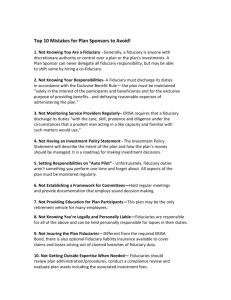

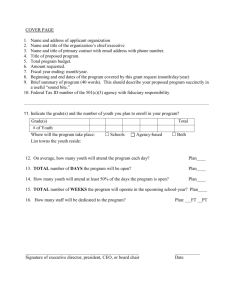
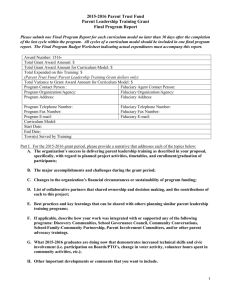
![Mark Whitenack Digital Assets PowerPoint Presentation []](http://s2.studylib.net/store/data/005383425_1-9cf830a5f2e9fc777daa963eb9460c8e-300x300.png)
